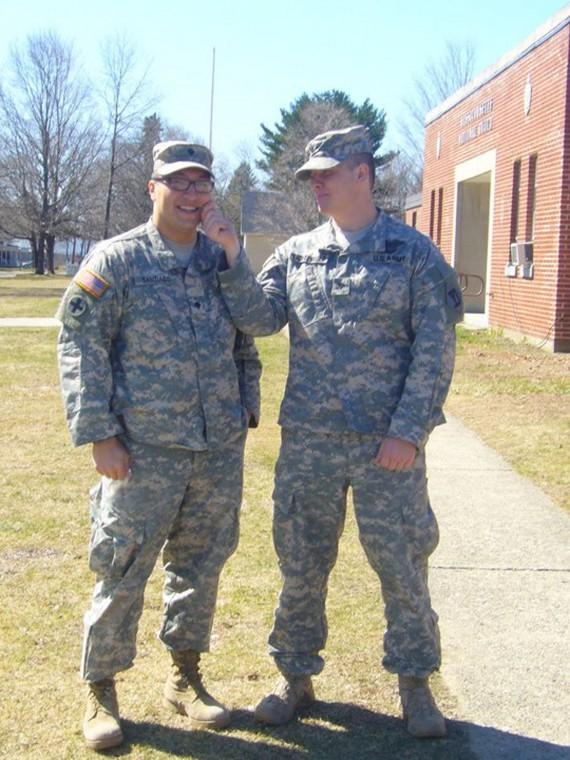Student soldiers adjust to life overseas
February 26, 2012
They work out, watch TV, play Xbox and conduct escort missions for Provincial Reconstruction Teams (PRTs) in East Afghanistan.
NIU students Corporal (CPL) Adam Lichtenauer, from Stillman Valley, and Specialist (SPC) Roberto Santiago, from Harvard, have been deployed with the U.S. Army to Kunar province in Afghanistan for eight months. They’re scheduled to be home sometime in April.
Both have been deployed once before, but to separate areas. Before their second deployment, Santiago was a sophomore psychology major and Lichtenauer was a sophomore business marketing major.
Santiago said they decided to deploy now so they wouldn’t have to worry about it later on in their careers.
“It takes a year and a half of school away,” Santiago said. “But then again, we aren’t in a hurry to finish school and just work the rest of our lives. No hurry for that.”
Lichtenauer said he had a few reasons for his decision to deploy early, primarily financial. As a student responsible for all his own expenses, Lichtenauer said a year’s worth of wages is important. Also, Lichtenauer said he chose to deploy between his sophomore and junior year instead of his junior and senior year.
“My first deployment disrupted it a little bit more than this one did,” Lichtenauer said. “But the worst part of it was just giving up the two-plus years. I would have already graduated had I not deployed, but I have never regretted either decision.”
There are several things soldiers have to adapt to once they get to Afghanistan. Santiago said it can take several days to weeks for new arrivals to adjust to the time difference: when it’s noon in DeKalb, it’s 10:30 p.m. in Kunar. Lichtenauer said new arrivals experience a culture shock, and the separation is difficult for a lot of men and women when they first arrive because it’s usually their first time away from their family and friends for such a long period of time.
“It’s not really what people ever picture when they’re back in America,” Lichtenauer said. “It’s more like some kind of third-world country a lot of the times. The only thing that really makes you realize it’s still the 21st century is that they have cars and cell phones.”
Both soldiers agree they miss little things, like having a convenient bathroom. Lichtenauer said it’s a pain to have to put a uniform on in the middle of the night to go to the bathroom.
“It was the worst when it would rain and you had to walk in the rain after a shower,” Santiago said.
Lichtenauer said other than missions, they have weekly chores that are split between squads. He said they generally know what they will be doing the next day. So when they don’t have a task at hand, the time is theirs to relax or prepare. They work out, watch DVDs of television shows, play video games and go on the Internet, Lichtenauer said.
“Most of the time we get our copies of TV shows through the local populous, so they’re kinda bad quality and sometimes out of date and missing things,” Lichtenauer said. “How I Met Your Mother is definitely the favorite.”
People often order TVs online to watch movies or plug their Xbox into, Santiago said. A majority of those people then sell the TVs to incoming units, but some mail them back home, Santiago said.
Santiago said he has a few perks in Afghanistan that he doesn’t always get in the U.S.
“I enjoy not having to wash my own laundry or worry about the clothes I’m putting on tomorrow,” Santiago said. “I have three solid meals a day and I don’t pay for fuel or insurance.”
The base also provides the soldiers with some furry entertainment: Lichtenauer said the base is home to a few endangered Afghan jungle cats.
“Some people have been playing around with them,” Lichtenauer said, “We’re not really allowed to just because they don’t get shots, but we’re trying to get them vaccinated.”
Lichtenauer said they get care packages with magazines, junk food, baby wipes and snacks. The mail speed is normally pretty good, Lichtenauer said, but sometimes it’s drastically delayed — he once had a package that took about six months to arrive.
Their unit has about one more month in Afghanistan and then one month in transition, Lichtenauer said.
Lichtenauer is already enrolled for summer semester at NIU. Santiago plans to return, but is not enrolled yet.
Lichtenauer has an idea of what he is going to do once he gets home.
“The first thing I’m probably going to do is put on a pair of jeans and go for a drive by myself with the windows down and the music cranked,” Lichtenauer said. “It’s the little things that you miss the most.”







